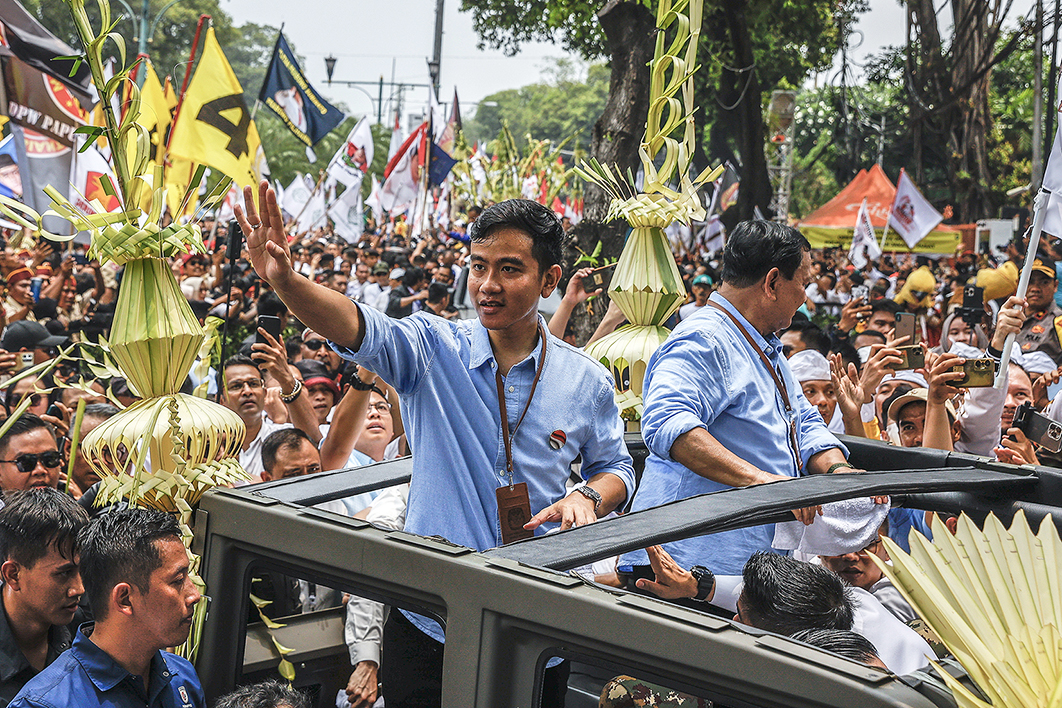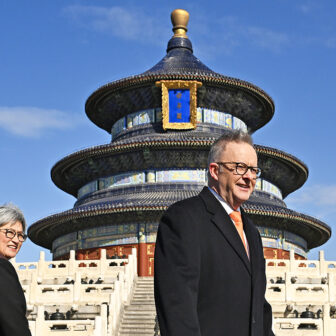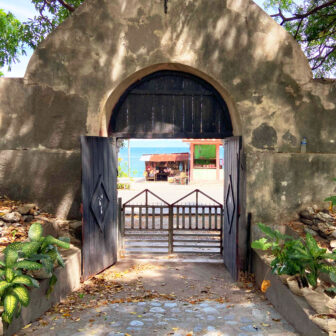On Google Maps, somebody has renamed Indonesia’s constitutional court, the Makhamah Konstitusi, as the Mahkamah Keluarga — the Family Court. For outsiders, the new label offers a glimpse of a ruling that might turn out to be an inflection point for Indonesian politics.
Coming just as candidate registrations opened for the 2024 presidential elections on 16 October, the five–four majority decision of the court created a loophole exempting elected officials from a rule that barred those aged under forty from joining the contest. It was all too convenient for the ambitions of thirty-six-year-old Gibran Rakabuming Raka, who had followed in the footsteps of his father, president Joko Widodo (known as Jokowi), by being elected mayor of their home city of Surakarta in 2020.
In recent months momentum had been gathering behind the idea of Gibran as running mate of defence minister Prabowo Subianto, the controversial former Soeharto henchman now widely seen as the frontrunner in the race to replace Jokowi. The court gave Jokowi, Prabowo and Gibran just the loophole they needed. Legal experts and the broader commentariat were scathing of its poorly reasoned decision, and of the crucial role played by the chief justice — who happens to be the president’s brother-in-law and Gibran’s uncle. Family Court, indeed.
But Jokowi didn’t become Indonesia’s most powerful president since Soeharto by caring much about the intelligentsia’s ideas of propriety. In brushing off criticism of the court’s decision and his son’s candidacy he struck a populist tone, declaring that “the people are the ones who mark a ballot, not we elites.” With approval ratings exceeding 80 per cent, he’s the most popular of any outgoing president in Indonesia; his endorsement provides a strategic advantage to any candidate looking to replace him.
Despite his disingenuous claims to neutrality, Jokowi is now well and truly off the fence in the contest between Prabowo and his main rival, Ganjar Pranowo, who — like Jokowi — is affiliated with the nationalist PDI-P party controlled by former president Megawati Soekarnoputri. The president’s disillusionment with the former Central Java governor — whom he sees as lacking independence from PDI-P and Megawati — has drawn him closer in recent months to Prabowo, who has carefully courted Jokowi’s favour by consulting him on key strategy decisions.
Prabowo and Gibran officially appeared together for the first time as running mates on 25 October, upstaging their rivals with a flashy stadium rally in Jakarta before leading a parade towards the electoral commission to submit their paperwork.
The unveiling of the Prabowo–Widodo alliance has changed the race to succeed Jokowi in important ways yet changed very little. Neither the constitutional court’s controversial ruling nor the nomination of Gibran appears to have had any immediate impact on any candidate’s popularity.
Polls still point to a two-round presidential election, with the likely elimination of former Jakarta governor Anies Baswedan after an initial vote on 14 February giving way to a 26 June runoff between Prabowo and Ganjar. Prabowo’s success in the runoff will depend on the support of Anies’s voters, who mostly comprise the determinedly anti-Jokowi, and especially conservative Muslim, part of the electoral coalition Prabowo assembled at the last election in 2019. He’s counting on them voting for him, despite his accommodation with the Widodo family, out of antipathy to PDI-P and its secularist tendencies.
Jokowi’s support for Prabowo flies in the face not only of PDI-P’s preferences but also those of his own electoral base: about 55 per cent of those who voted for his re-election in 2019 tell pollsters they prefer Ganjar, while only 25 per cent have shifted to Prabowo. A key goal of pairing Gibran with Prabowo is to draw more Jokowi voters — largely concentrated in PDI-P’s Central and East Java heartland, where Ganjar has a sizeable lead — into Prabowo’s electoral coalition.
Nor is the vice-presidency the only front in the fight for a Widodo dynasty. In late September Gibran’s twenty-eight-year-old brother Kaesang Pengarep was appointed chairman of PSI, a minor party astroturfed into existence early in Jokowi’s presidency by sympathetic business and political figures, which recently endorsed Prabowo. The hope is that with the Widodo family halo above PSI, it will for the first time win the 4 per cent of the vote required to be awarded seats in the national legislature — and, now it has formally endorsed Prabowo, be rewarded with a share of cabinet seats if he wins. Speculation suggests that Gibran’s elevation to Prabowo’s ticket will be accompanied by his own defection from PDI-P to Golkar, the one-time regime party of Soeharto and another key member of the coalition supporting Prabowo’s campaign.
Take a moment to appreciate the sheer chutzpah Jokowi is showing in all this: putting one of his sons in control of a party whose principal strategy is to steal votes from PDI-P and putting another into a presidential campaign whose strategy involves poaching votes from PDI-P’s candidate — all while he himself is still a card-carrying member of the party.
PDI-P has little choice but to hold its fire. As one analyst puts it, Jokowi and the party are in a “mutual hostage situation” ahead of legislative elections to be held concurrently with the first round of the presidential vote on 14 February. For now, it’s not in PDI-P’s interest to have an acrimonious public split with a president who, even if his relationship with the party is becoming untenable, is still its most popular and influential cadre.
While Gibran’s candidacy has yet to change the state of the electoral horse race, it nonetheless has significant implications for Jokowi’s approach to the elections, and the political significance of their outcome for him.
Even as he became Indonesia’s most powerful post-reformasi head of state, Jokowi’s roots in the country’s political institutions remained quite shallow. His authority has rested not on direct control of a party, a social movement, a large personal fortune or even a particularly coherent band of cronies, but rather on the deterrent effect his huge popularity has on would-be opponents of his policies, and his willingness to use the legal system to coerce elites into cooperating with his political goals.
A key question that loomed over all this was his likely ability to wield influence after losing office. His efforts to engineer a constitutional amendment to delay the election, or allow himself to run for a third term, resulted in a rare defeat. Jokowi now seeks to anchor his post-presidential influence in a political dynasty the likes of which Indonesia has never seen at the national level, succeeding where former presidents Megawati and Susilo Bambang Yudhoyono have failed in their efforts to secure presidential or vice-presidential candidacies for their children.
Has Jokowi accurately judged the risks and rewards of this strategy? If Ganjar can eke out a win, Jokowi will surely be exposed to withering revenge from PDI-P for his alliance with Prabowo. But even if Prabowo prevails, Jokowi might prove to have overestimated the payoffs. On paper, a Prabowo presidency would place members of the Widodo clan not only first in succession to a septuagenarian president but also potentially heading a debutante parliamentary party (PSI) and a new power base in an established one (Golkar), both of which are members of the nominating coalition that would have the pick of key cabinet posts.
But the real-world influence of all this is uncertain. Once he has settled in as president, Prabowo would have no compunction about sidelining Jokowi as part of any effort to assert his dominance over the political scene. A likely scenario is that the Widodo clan comes to resemble the Soekarnos or the Yudhoyonos: just one among many factions in a political oligarchy whose collective power, especially under Prabowo, would be checked by the overbearing presidency that Jokowi has given rise to.
It’s also important to set this within the record of Indonesian dynastic politics more generally. While a rising proportion of parliamentarians and local leaders have family ties to other elected officials, these dynasties have remained localised and small-scale, with little of the staying power of those in the Philippines, India or Thailand — or even consolidated liberal democracies like Japan and Taiwan.
The emergence of a Widodo dynasty as part of the national political furniture doesn’t on its own imperil Indonesian democracy. The worry is that Jokowi’s decision to take such a large stake in a Prabowo victory gives him a powerful incentive to use all the levers of incumbency to help bring it about. This could encompass his influence over the bureaucracy, local governments, big business, the police, the military — and if recent events are any guide, perhaps even the constitutional court, which adjudicates legal challenges to the results of elections.
In the end, the hazards for democracy that lie in Jokowi’s dynasty-building might have less to do with the ends than with the means. •




